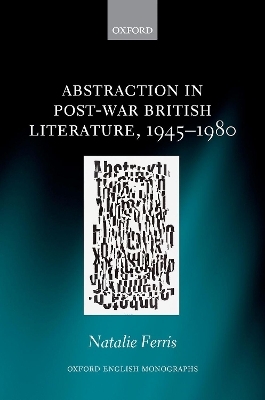
Abstraction in Post-War British Literature 1945-1980
Seiten
2022
Oxford University Press (Verlag)
978-0-19-885269-8 (ISBN)
Oxford University Press (Verlag)
978-0-19-885269-8 (ISBN)
Abstraction in Post-War British Literature explores the ways in which writers and thinkers responded to non-representational art in the decades following the Second World War. By offering a chronological overview of the period in Britain, it questions how abstraction came to be discovered, absorbed and reimagined in literature.
In a catalogue note for the 1965 exhibition 'Between Poetry and Painting' at the Institute of Contemporary Arts, the poet Edwin Morgan probed the relationship between abstraction and literature: 'Abstract painting can often satisfy, but "abstract poetry" can only exist in inverted commas'. Language may be fragmented, rearranged, or distorted, abstract in so far as it is withdrawn from a particular system of knowledge, but Morgan was of the mind that to be wholly 'disruptive' was to deprive a poem of its 'point' as an 'object of contemplation'. Whilst abstract art may have come to fulfil or or fortify an impression of post-war taste, abstraction in literature continued to be treated with suspicion. But how does this speak to the extent to which Britain's literary culture was responsive to progress compared to its artistic culture?
Abstraction in Post-War British Literature 1945-1980 traces a line of literary experimentation in post-war British literature that was prompted by the aesthetic, philosophical and theoretical demands of abstraction. Spanning the period 1945 to 1980, it observes the ways in which certain aesthetic advancements initiated new forms of literary expression to posit a new genealogy of interdisciplinary practice in Britain. At a time in which Britain became conscious of its evolving identity within an increasingly globalised context, this study accounts for the range of Continental and Transatlantic influences in order to more accurately locate the networks at play. Exploring the contributions made by individuals, such as Herbert Read, Ian Hamilton Finlay and Christine Brooke- Rose, as well as by groups of practitioners. It brings a wide range of previously unexplored archival material into the public domain and offers a comprehensive account of the evolving status of abstraction across cultural, institutional, and literary contexts.
In a catalogue note for the 1965 exhibition 'Between Poetry and Painting' at the Institute of Contemporary Arts, the poet Edwin Morgan probed the relationship between abstraction and literature: 'Abstract painting can often satisfy, but "abstract poetry" can only exist in inverted commas'. Language may be fragmented, rearranged, or distorted, abstract in so far as it is withdrawn from a particular system of knowledge, but Morgan was of the mind that to be wholly 'disruptive' was to deprive a poem of its 'point' as an 'object of contemplation'. Whilst abstract art may have come to fulfil or or fortify an impression of post-war taste, abstraction in literature continued to be treated with suspicion. But how does this speak to the extent to which Britain's literary culture was responsive to progress compared to its artistic culture?
Abstraction in Post-War British Literature 1945-1980 traces a line of literary experimentation in post-war British literature that was prompted by the aesthetic, philosophical and theoretical demands of abstraction. Spanning the period 1945 to 1980, it observes the ways in which certain aesthetic advancements initiated new forms of literary expression to posit a new genealogy of interdisciplinary practice in Britain. At a time in which Britain became conscious of its evolving identity within an increasingly globalised context, this study accounts for the range of Continental and Transatlantic influences in order to more accurately locate the networks at play. Exploring the contributions made by individuals, such as Herbert Read, Ian Hamilton Finlay and Christine Brooke- Rose, as well as by groups of practitioners. It brings a wide range of previously unexplored archival material into the public domain and offers a comprehensive account of the evolving status of abstraction across cultural, institutional, and literary contexts.
Natalie Ferris is a Leverhulme Trust Early Career Fellow in the School of Literatures, Languages & Cultures at the University of Edinburgh. She is the Deputy Editor of The Cambridge Humanities Review and is the co-founder and convenor of the Christine Brooke-Rose Society.
Introduction: A 'World out of Gear': The Question of Abstraction in Post-War Britain
1: Visual Signs: Abstraction, Poetry and The Pope of Modern Art
2: A New Cohesive Element: Ian Hamilton Finlay, Abstract Art and the Abolition of Syntax
3: Objects, Concepts, Installations, Bookworks: Literature in an Expanding Field
4: 'Seeing comes before words': New Frames of Perception on Page and Screen in John Berger, Christine Brooke-Rose and B.S. Johnson
| Erscheinungsdatum | 30.03.2022 |
|---|---|
| Reihe/Serie | Oxford English Monographs |
| Verlagsort | Oxford |
| Sprache | englisch |
| Maße | 165 x 240 mm |
| Gewicht | 512 g |
| Themenwelt | Geisteswissenschaften ► Sprach- / Literaturwissenschaft ► Anglistik / Amerikanistik |
| Geisteswissenschaften ► Sprach- / Literaturwissenschaft ► Literaturwissenschaft | |
| ISBN-10 | 0-19-885269-X / 019885269X |
| ISBN-13 | 978-0-19-885269-8 / 9780198852698 |
| Zustand | Neuware |
| Haben Sie eine Frage zum Produkt? |
Mehr entdecken
aus dem Bereich
aus dem Bereich
Poetik eines sozialen Urteils
Buch | Hardcover (2023)
De Gruyter (Verlag)
CHF 83,90
Buch | Softcover (2024)
belleville (Verlag)
CHF 27,95


